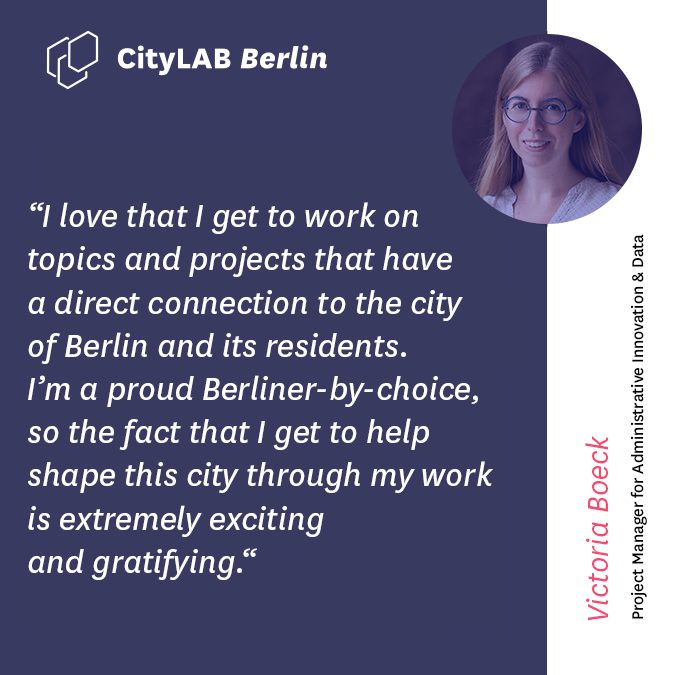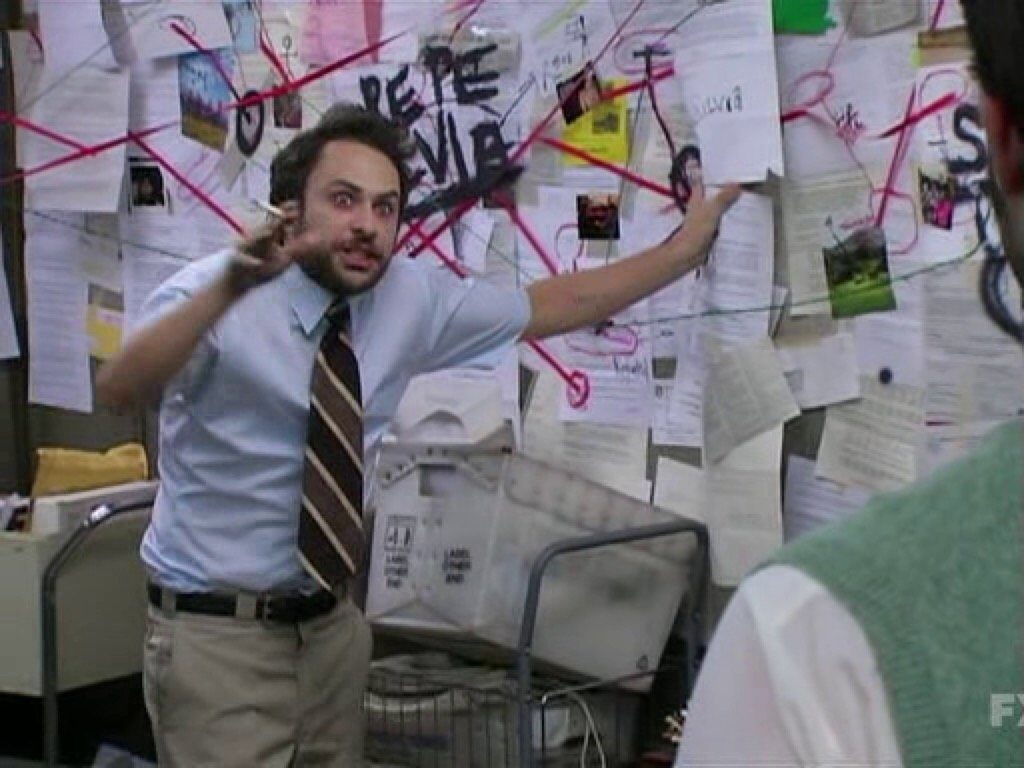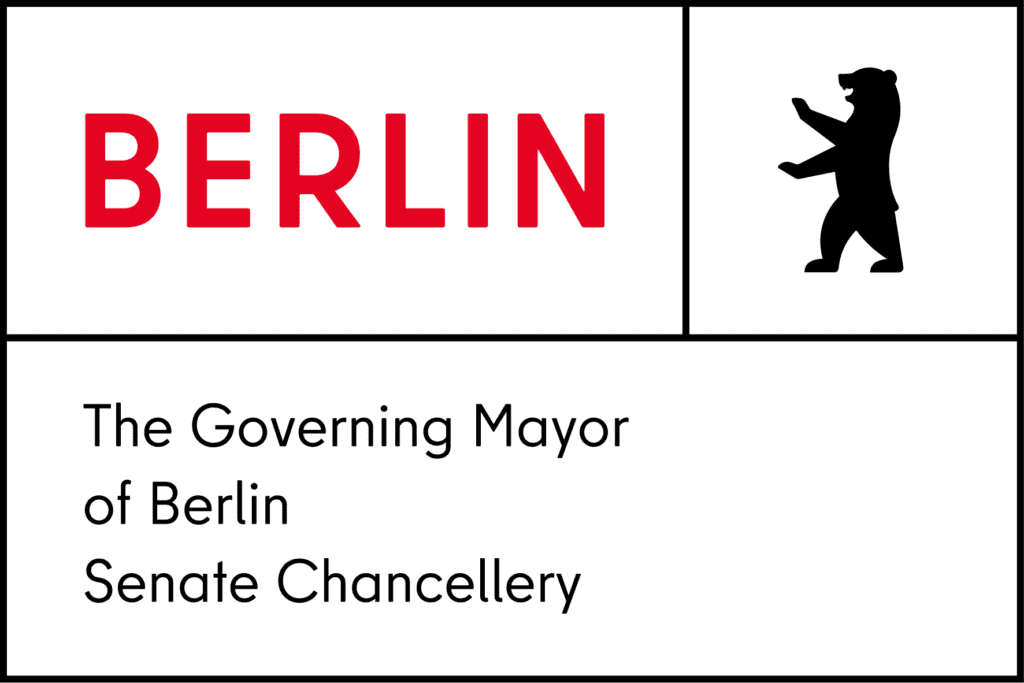CityLAB Berlin would be nothing without its employees, who draw on a wide range of expertise to advance digitalization in Berlin. Our series The minds behind CityLAB Berlin introduces you to different CityLAB team members every month.
Inside Victoria Boeck’s mind

1. Who are you and what is your role at CityLAB Berlin?
I’m Victoria Boeck, but you can just call me Tori. For several years I led the ODIS project at the Technologiestiftung Berlin (the CityLAB’s parent organization), which is focused on promoting the publishing and usage of open government data in Berlin. Recently I switched roles and am now a project manager for government innovation and data at the lab.
2. What is your background?
I studied Public Policy at the Hertie School in Berlin. During my studies, I completed an internship with re:publica, a leading tech and society conference in Berlin. After that, I worked as a student researcher and later as a full researcher on a project that used open data to identify signs of corruption in public procurement processes. These various experiences gave me the opportunity build up my expertise in digital topics – especially in open data – as well as to meet many fascinating people in the field. Eventually this led me to the Technologiestiftung in 2018, and I’ve been working there ever since!
3. What do you like most about your work at CityLAB Berlin?
I love that I get to work on topics and projects that have a direct connection to the city of Berlin and its residents. I’m a proud Berliner-by-choice – I moved to Berlin in 2014 and don’t imagine I’ll ever leave – so the fact that I get to help shape this city through my work is extremely exciting and gratifying.
4. What picture best describes your work?

A big component of my job is understanding Berlin’s digital landscape and trying to make sense of how the various players and entities fit together. For example, on the topic of open data, I might ask myself: Does this dataset exist already somewhere in the city government? If it does, what entity is responsible for gathering that data or putting the dataset together? Is that entity the same one that has the authority to actually publish the data, or is there another entity somewhere that holds that power?
Or, when we are interested in doing an innovation project on a concrete topic, I start asking: What are all the government bodies – agencies, departments, etc. – that might have an interest in this topic? Who do we need to actively involve in project discussions? Who maybe just needs to receive a courtesy update now and then? Do we need to be strategic about who we approach about this topic and in what order we approach stakeholders? It sounds a bit convoluted, but depending on the sensitivity of a subject and the players involved, it can be very important to think carefully about how you start!
5. What are you currently reading?
I am sadly terrible about reading books regularly, but I at least do try to read a lot of articles daily about various tech and digital topics. For example, I am subscribed to the D64-Ticker, which offers a compact overview of the day’s top tech and digital policy stories, particularly those that are relevant for the German sphere. I also try to read the Hackernewsletter each week, which is a great summary of the top posts of the week from the tech site Hacker News. Not everything from that newsletter is relevant for me (some of it is just a bit too nerdy for me), but it’s always an interesting mix of current events, the latest developments in programming languages, and absurd and creative web projects.
6. What defines a good team for you?
Mutual respect! We don’t always have to have the same opinion or perspective on topics, and it’s ok to be critical – but fair – of others’ work. But you need to do so in a way that is respectful: this criticism should never be personal, and you should always come from the perspective that we are all part of the same team, that we all want to do good work, and we are trying our best to achieve that. If someone misses the mark, they shouldn’t be berated for it but instead you should see what you can do to help them.
7. What are you passionate about?
I love eating good food, and I have been known to have some strong opinions about what constitutes that. I’m always planning future meals, whether it be searching for new recipes to try or scoping out restaurants I want to try. I also usually try to plan my trips in the city around food: either so that I have a chance to stop by a restaurant I love but haven’t been to in ages, or so that I can finally try a place that has been on my list for ages.
8. What does the term “smart city” mean to you?
I know there are many different (and differing) perspectives on this topic, but I’m a bit old school: for me, the usage of technology and data is essential to being a smart city. Specifically, I define a smart city as a city that consciously – but thoughtfully – utilizes technology and data to improve the lives of its residents. These improvements should always be understood from the perspective of the people being affected: if you haven’t first attempted to understand the needs of the people whose lives you are trying to improve and to engage in dialog with them, there’s a slim chance you’re actually going to make meaningful positive changes to their lives. Moreover, a smart city is a city that knows there is a time and a place where it makes sense to rely on technological solutions and that not all problems – frankly, very few problems – can be solved with a bit of money and some lines of code.
9. What’s your favorite shortcut?
For Mac Users: Command + Shift + 4. That allows you to take a snippet screenshot – i.e., a screenshot where you select a portion of the screen to capture in a screenshot. I use this shortcut multiple times a day (for example, to inject more clarity into my emails or messages: “This block of text here needs to be changed” or “This is what I see when I open this website”). I want to scream every time someone takes a blurry picture of a computer screen with their smartphone and then sends that to me as a “screenshot”.
10. What’s the craziest thing that’s ever happened to you at the LAB?
Well, this actually pre-dates the lab a bit, but after 4.5 years at the Technologiestitung I still find it a bit crazy that I may have never found my way to this job without Twitter. Ben (the director of the CityLAB) and I had been following each other on Twitter for a bit and had noticed we often were posting about similar topics; at some point he sent me a DM and invited me to come to the Technologiestiftung one afternoon just to get to know each other and chat about topics like open data and the digitization of government services in Berlin. After our talk, I decided to apply for a position that was open in his team, and the rest, as they say, is history.
